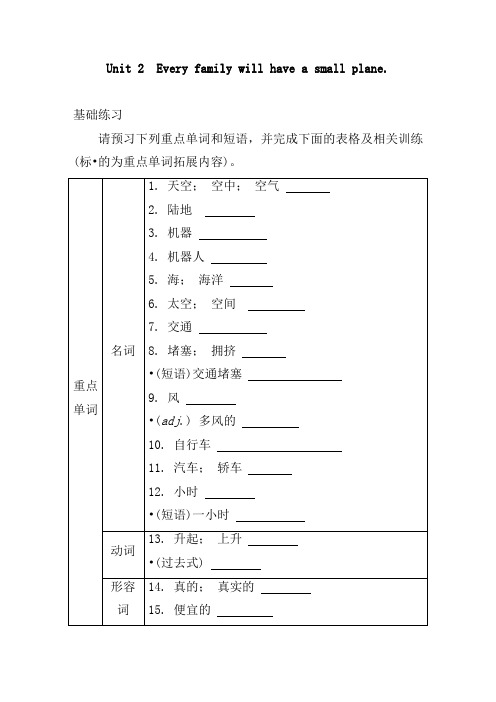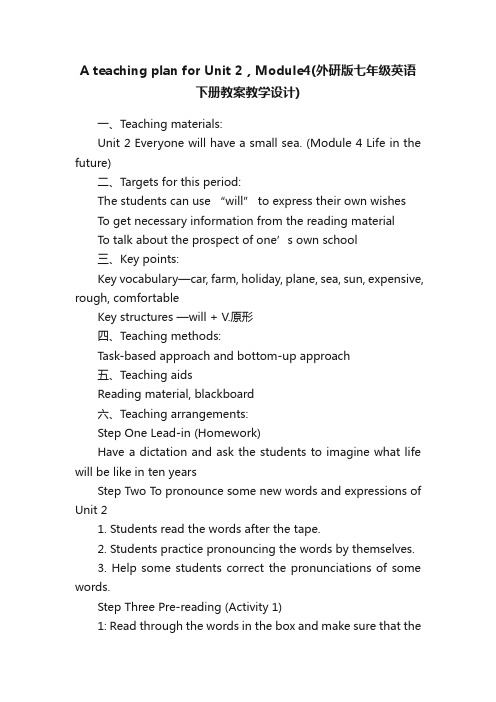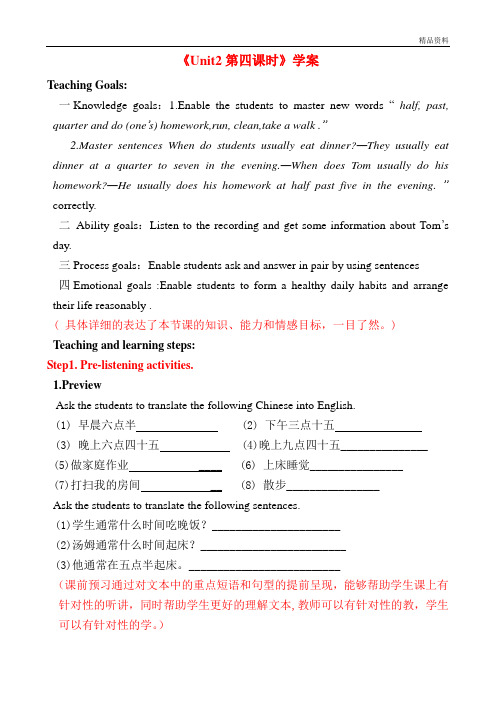七年级英语 Unit 2 Module 4 学案
外研版英语七年级下Module4Unit2教案1

七年级(下)Module 4 Life In the FutureUnit 2 Everyone will have a small car一、教学内容分析本模块以未来的教室及学习为切入点,谈论将来我们生活的各个方面,学生较为有兴趣,便于展开活动。
Unit2的主要内容是一篇有关于描述未来生活的阅读文章及相关习题。
二、学生情况分析本模块以学生心目中的未来为话题,这与学生的现实生活密切相关,,而涉及的语法项目是一般将来时will 加Be动词加形容词的用法以及有关于将来时的肯定否定句式。
三、教学目标1.以谈论将来生活为中心,介绍并询问有关将来生活的信息.2. 能运用一般将来时中出现形容词的句式。
四、教学重点和难点1.词汇的正确运用。
2.一般将来时will 的陈述句,否定句,一般疑问句及回答五、教学策略任务型教学、自主学习、合作学习六、教学手段TAPE七、教学过程competitionShow their homework. A poster about their home .choose the best one and put it on the wall. (分享学生的海报,并评出最佳海报,让学生更积极地参与活动)Step2. Presentation(1) Teach new words with pictures.(2) Read through the new words and have the students follow and then repeat .(3) Ask and answer: What can you see in the pictures? I can see…and answer the questions(1)Read quickly and match the pictures and headings.(2)Read carefully and find the adjectives and its opposite meanings.(3)Read one by one paragraph to finish the relative exercises and check the answers.(在处理阅读课的时候,先使用略读,再使用跳读,再使用精读,培养了学生阅读的技巧。
(完整版)外研版英语初一下册Module4Unit2.学案

Unit 2 Everyone will have a small car.学案课型:阅读与写作课主备人:Elaine 任课教师:学习目标1.能读懂描述未来的短文,理解主篇的主旨与细节2.能用will描写对未来的想象和预测的内容3.能用so表示结果。
第一课时知识梳理(自主预习)I请朗读以下音标,写出M4U1 单词表的单词和中文意思,试着朗读并记忆这ⅡTeaching Steps (走进课堂)1) Choose the correct answers(选出正确答案)①Why will flying be very cheap?A. There will be more cars.B. Fuel(燃料)will be very cheap.C. Everyone will have a small planes.D. Planes will be very large.②_____ will do heavy or difficult jobs in the future.A. People B. Robots C. Machines D Robots and machines③The summer will be ________ and the spring will be _______.A. warm, coolB. hot, coldC. cool, warmD. hot, warmTask 5 Writing 写作随着科技的发展,越来越多的机器人被制造出来,除了大量应用于工业外,机器人也走进人们的生活,几乎每个家庭有一个机器人。
请以Robots at home in the future为题,写一篇短文,谈谈机器人在未来家庭中的应用情况(比如:打扫卫生、洗衣、做饭、照顾老人和小孩等)。
要求:1、条理清楚、意思连贯、语句通顺、标点正确。
2、50-60词。
Robots in the futureIn the future, there will be a robot in everyone’s home._______________________________________________________________________________ _______________________________________________________________________________ _______________________________________________________________________________ _______________________________________________________________________________ _______________________________________________________________________________ _______________________________________________________________________________ _______________________________________________________________________________ _______________________________________________________________________________ ⅢTest after class(课后检测).1)根据汉语提示完成下列句子,每空一词。
Module4Unit2导学案英语七年级下册(1)

Unit 2Every family will have a small plane.基础练习请预习下列重点单词和短语,并完成下面的表格及相关训练(标•的为重点单词拓展内容)。
学以致用根据语境或提示,完成填空。
1. Every day, the sun r ises in the east.2. There is a traffic (交通) jam on Nanjing Road now.3. They waited for about half an h our .4. These machines (机器) can help us do lots of work.5. It's warm and windy (多风的) in spring in Zhengzhou.6. Jack always puts his things everywhere (到处).7. Now people are able to walk in space (太空).8. Nick is good at finding c heap flights(航班). So he can save some money.9. This box is so h eavy , and the little boy can't carry it.10. If you want to make your dream e true , you should study hard.佳句仿写用句中黑体词或短语仿写句子。
1. What will life be like in the future?2. Which ones will e true?3. The sea level will rise as well.4. No more expensive cars …句子仿写下周天气将会怎样呢?我希望我的梦想将会成真。
外研版英语七年级上册Module 4 Unit 2学案

Module 4 Healthy foodUnit 2 Is your food and drink healthy? 【预习目标】1 掌握并熟练运用如下词汇:candy, Coke, fish, hamburger, ice cream, noodles, rice2 学会区分安康食品与不安康食品。
3 掌握but/and 的用法。
4 进一步稳固掌握have / has got;some/any在文章写作中的具体运用;5 简单了解中西方饮食文化的区别。
【预习内容】Module4 Unit2【预习检测】根据汉语提示及句意完成句子。
1.Let’s go shopping for food and _______ (饮料).2. We haven’t got any _______ (肉).3. Let’s get some _______ (鸡肉).4. Have you got _____ (一些) chocolate?5. Let’s get some ______ (咖啡) for mum.6. What _______ (种类) of fruit do you like best?【展示交流与合作探究】Task 1Work in pairs.1. Remember six words for food and drink. Make two lists.Healthy food and drink:Favourite food and drink:2. Look at the pictures. Label the food and drink.3. Call back the answers from the whole class.4. Read the words after the teacher.Task 2 Reading.1. Play the recording.2. Ask the students to read through the passage.3. Read the passage and complete the table.4. Check with a partner.5. Call back the answers from the whole class.Task 3Do exercises.1. Ask the students to read through the passage in Activity 4.2. Complete the passage with the correct from of the words and expression from the box..3. Check with a partner.4. Call back the answers from the whole class.5. Read the passage together.Task 4Work in pairs.1. Ask the students to choose food from Units 1 and 2 for their meals.2. Talk about their answers like this:1) What’s your favourite food and drink?2) Is it healthy food and drink?Task 5WritingLook at the sentences: Meat and fish are healthy food. Too much meat isn't healthy.(1)Read the examples with the class.(2)Work in pairs: Student A reads the first sentence in each example and student B reads the second one.Now join the sentences with but.(3)PingPong game: Student A reads both sentences, and student B puts them together with “but〞. Then student B reads another two sentences, and student A puts the two sentences together with“but〞.(4)Ask the students to write the sentences individually, and then check with their partners.(5)Demonstrate that it isn't necessary to repeat something if it is the same as in the first part of the sentence.【达标拓展】完成句子:1.你最喜欢的食物和饮料是什么?What ________________ food and drink?2.多喝水是非常重要的。
AteachingplanforUnit2,Module4(外研版七年级英语下册教案教学设计)

A teaching plan for Unit 2,Module4(外研版七年级英语下册教案教学设计)一、Teaching materials:Unit 2 Everyone will have a small sea. (Module 4 Life in the future)二、Targets for this period:The students can use “will” to express their own wishesTo get necessary information from the reading materialTo talk about the prospect of one’s own school三、Key points:Key vocabulary—car, farm, holiday, plane, sea, sun, expensive, rough, comfortableKey structures —will + V.原形四、Teaching methods:Task-based approach and bottom-up approach五、Teaching aidsReading material, blackboard六、Teaching arrangements:Step One Lead-in (Homework)Have a dictation and ask the students to imagine what life will be like in ten yearsStep Two To pronounce some new words and expressions of Unit 21. Students read the words after the tape.2. Students practice pronouncing the words by themselves.3. Help some students correct the pronunciations of some words.Step Three Pre-reading (Activity 1)1: Read through the words in the box and make sure that thestudents understand them all.2. Ask the students to look at the pictures and tell their partners what they can see in the each one.3. Collect their answers in a whole-class setting as complete sentences.4. Learning to learn: Before the students read the passage, have them read through the Learning to learn box.5. Talk about the importance of inferring the meaning from context, and the fact that it is not necessary to understand every word in order to understand the general meaning of a text.Step Four Fast reading (Activity 1&2)1. Ask the students to read through the passage individually, and then match the paragraphs with the pictures.2. They should check with a partner.3. Collect the answers in a whole-class setting; ask a student to read a paragraph and then say which picture it goes with.Step Five To match the pictures and paragraphs with the headings (Activity 3)1. Read through the words and have the students repeat them.2. Work on the syllable stress of the multi-syllable words.Cli/mate Homes Jobs Tech/nol/o/gy Tran/sport3. Make sure they understand what the words mean.4. Ask the students to match the paragraphs and pictures individually, then check with a partner.5. Collect the answers from the class.Cli/mate: Paragraph B-Picture 2 Homes: Paragraph C-Picture 5Jobs: Paragraph E-Picture 3 Tech/nol/o/gy: Paragraph D-Picture 1Tran/sport: Paragraph A-Picture 4Step Six Careful reading(Activity 3)Ask the students to read through the sentences and decide which are true in the passage.Step Seven Detail explanation1. get1) get + adj. e.g. The food is getting cold.2) get sb. sth. = get sth. for sb.3) get to a place get up get on/off2. heat1) (v.) We’ll heat some milk for the coffee2) (n.) I can’t walk in this heat.3. three days a week once a year three times two weeksStep Eight Students practice reading the passage aloud1. Read through the words and have the students repeat them chorally and individually. (Activity 4)2. Make sure they understand the meaning of all of them.3. Ask the students to match the words individually, then check with a partnercheap-expensive comfortable-uncomfortable easy-difficult good-bad hot-cold interesting-dull large-small light-heavy new-old rough-smooth short-long strong-weak warm-cool Step Nine T o answer the questions (Activity 5)1. Read through the words and have the students repeat them after you.2. Ask them to find answers individually then check with a partner.Step Ten Writing (Activity 8)Read the example sentences, and help them to see that “so” relate the cause to the effect to become a single sentence withtwo clauses.e.g. Planes will be very large. Flying will be very cheap.----Planes will be very large so flying will be very cheap.1. It will probably be hot all year so the winter will be very short.2. We’ll use the sun to heat our homes so no one will be cold and there’ll be lots of hot water.3. People will work three days a week so they’ll have long holidays and lots of free time.Homework:1. To talk about life in the future in pairs2. To finish Unit2, Module4, 点中典Blackboard designingUnit 2 Everyone will have a small sea.Headlines: notes-picturesCli/mate: Paragraph B-Picture 2 Homes: Paragraph C-Picture 5Jobs: Paragraph E-Picture 3 Tech/nol/o/gy: Paragraph D-Picture 1Tran/sport: Paragraph A-Picture 4The opposite adjective:hot-cold interesting-dull large-small light-heavy展开全文阅读new-old rough-smooth short-long strong-weak warm-coolcheap-expensive comfortable-uncomfortable easy-difficult good-badso-clausee.g. Planes will be very large. Flying will be very cheap.----Planes will be very large so flying will be very cheap.1. It will probably be hot all year so the winter will be veryshort.2. We’ll use the sun to heat our homes so no one will be cold and there’ll be lots of hot water.3. People will work three days a week so they’ll have long holidays and lots of free time.。
Module4unit2(第二课时)学历案七年级英语上册

学历案设计模板_________________________________________________________ 2. 我有许多牛奶。
_____________________________________归纳:much许多用来修饰不可数名词,lots of = a lot of 许多, 它既可以修饰可数名词,相当于many;也可以修饰不可数名词,相当于much。
(三)A bit tired? 感觉有点儿累吗?bit n. 一点儿;少许。
a bit“稍微;有点儿”,在肯定句中,用作副词词组,修饰形容词、副词、动词。
a bit可用作不定代词,意为“一点儿,少许”等。
Can you give me a bit?你能给我一点儿吗?a bit在后面加of构成短语,相当于a little,可以直接作定语修饰名词,两者都只能修饰不可数名词。
根据汉语提示完成句子(1)我的妈妈有点胖。
My mother is _____________ fat.(2)瓶子里有一点牛奶。
There is _____________ milk in the bottle. tired adj. 劳累的,一般作表语或定语,表示人的一种感受,主语通常是表示人的名词或代词。
be tired of厌烦。
tiring意为“使人疲劳的;累人的”,可作表语或定语,主语通常是表示事物的名词或代词。
(四)remember v.记住;想起,反义词是forget。
① remember后直接加名词或代词。
I can't remember his telephone number.我想不起他的号码。
① remember后可加动词不定式作宾语。
Remember to get some fruit.记着买些水果。
Can you r_________ her name?① remember 后面还可接动词的ing 形式,但意思与接不定式时不同。
新人教版七年级英语下册《Unit2第四课时》学案

精品资料《Unit2第四课时》学案Teaching Goals:一Knowledge goals:1.Enable the students to master new words “half, past, quarter and do (one’s) homework,run, clean,take a walk .”2.Master sentences When do students usually eat dinner?—They usually eat dinner at a quarter to seven in the evening.—When does Tom usually do his homework?—He usually does his homework at half past five in the evening. ”correctly.二Ability goals:Listen to the recording and get some information about Tom’s day.三Process goals:Enable students ask and answer in pair by using sentences四Emotional goals :Enable students to form a healthy daily habits and arrange their life reasonably .( 具体详细的表达了本节课的知识、能力和情感目标,一目了然。
) Teaching and learning steps:Step1. Pre-listening activities.1.PreviewAsk the students to translate the following Chinese into English.(1) 早晨六点半 (2) 下午三点十五(3) 晚上六点四十五 (4)晚上九点四十五_______________ (5)做家庭作业 ____ (6) 上床睡觉________________(7)打扫我的房间 __ (8) 散步________________Ask the students to translate the following sentences.(1)学生通常什么时间吃晚饭?______________________(2)汤姆通常什么时间起床?_________________________(3)他通常在五点半起床。
外研版新教材七年级下册Module4Unit2导学案

Module 4 Life in the future班级_______ 姓名________ 小组_______ 等级______Learning Aims:1.Memorize 25 key words and 10 phrases in M4U2;improve the ability of fast reading and detailed reading.2. Learn the method of describing the future with will by cooperation and discussion.3. Form the active attitude towards to life and make your own plan for the bright future.【使用说明与方法指导】1.运用双色笔,在课本上划出重点单词、短语、句型;并标出自己的疑难点。
2.通过逐层阅读,把握文章大意,获取文章细节信息。
【预习案】I.. 阅读训练:认真预习P22课文---Life in the future.(方法导引:采用扫描式阅读,寻找有用信息,对无关部分可以省略。
)一. Fast-reading(快速浏览课文,不要在难于理解的单词处停顿,重在大意理解, 回答下列问题。
)1.Match the paragraphs with the headings. (把段落A.B.C.D与标题相匹配)1. Para. --- Weather2. Para. ---Clothes 3 .Para. ---Jobs 4. Para. ---Travel2. Check(√) the true sentences.(1) People have to change clothes in hot weather. ( )(2) The weather will be warm in spring. ( )(3) A lot of people will travel by plane so maybe there will be traffic jams in the air. ( )(4) People will have long holidays because machines will do heavy work. ( )二.Careful-reading细节阅读:(认真阅读课文,弄清细节,才能正确获取信息呀!)1. What will clothes be like in thefuture? .2.Why the sea level will rise? .3. Why will there be traffic jams in the air? .4. Who will do heavy and difficult jobs in the future? .II.基础夯实:1. 默读课文M4 Unit2课文一遍,找出下列单词的反义词:easy________expensive________ hot_______ large_______ light_______ long_________warm _______ 2. 找出以下短语, 并在课本中勾划,有选择的标注汉语。
- 1、下载文档前请自行甄别文档内容的完整性,平台不提供额外的编辑、内容补充、找答案等附加服务。
- 2、"仅部分预览"的文档,不可在线预览部分如存在完整性等问题,可反馈申请退款(可完整预览的文档不适用该条件!)。
- 3、如文档侵犯您的权益,请联系客服反馈,我们会尽快为您处理(人工客服工作时间:9:00-18:30)。
Module 4My familyUnit 2I’ve got a small family.导学案(I)(一)学习目标:1. 知识目标:(1) 学习grandmother,grandparent,uncle have got email him make 等词汇。
2,掌握there be have/has got 的具体用法。
________.能力目标:1,能顺利理解介绍家庭,朋友的文章。
2,提高学生的阅读能力。
3,正确运用there. be 和have/has got 这两个句型。
情感目标:We should love my family and help the other students.(二)学习重点、难点1,have/has got 的进一步运用。
2,学习如何书写段落,注意标点符号和大小写。
三,问题导学:1,翻译下列词组1.一个大家庭2.一封邮件3.在托尼的家庭中4.在中国5.在美国6.一位英国朋友7.和他一起8.在英国2,根据句意及首字母提示补全单词1 How many p___ are there in your family?2,Is your family s_______?3,He has got a b_____ house.4,My u ________ works in a hospital.5,His s _____ is a nurse.(四)典题训练:一,用所给单词的适当形式填空1,Betty is China with ____(she)family.2,Do you know how many _____(family)are there in your city?3,Can you give me _____(a)e-mail.4,My parents love ____(I)very much.5,I have _____(a)uncle and _____(a)aunt.6,He’s my _____(father)friend.7,They are _____(China)cars.8,Can he ______(swim)in the river?9,My _____(have)got an e-mail.10,Tom is_______(she)uncle.-二,句型转换1,I have got some brothers and sistrts.(改为否定句)I ____ _____ _____brothers _______sisters.2,Lingling has got an American friend. (改为一般疑问句)______Lingling ______an American friend?3,Linda has got some apples.(用bananas改为选择疑问句)。
_____Linda ____ ______ apples_______bananas?4,Lingling has got American friend.(改为同义句)______friend is ______.5,That is my uncle.(改为同义句)That is my ______ ________.6,Betty has got four grandparents(对划线部分提问)_____ ______grandparents_______Betty got?(五)归纳小结指导学生总结归纳have has got 的用法及注意点,同时引导学生学习如何书写段落,注意标点符号和大小写。
(六)随堂检测:补全短文Dear Mingming;:Thank you _____your letter .I have got a big _____.There are ______people in my family –my mother and father and my two grandparents and me.I have got ______aunt ______name is Jane.I have’t_______any uncles______brothers.How_______people are there in your family?________ you got a big family _______a small family?Diana.性物主代词动动脑筋,试试自己能否完成下面题目,如果完成不了的,通过小组合作完成:①English—England(英国)根据这种形式,完成下面其它国籍的词汇填写:____________—____________ (中国)____________—____________ (美国)____________—____________ (日本)____________—____________ (澳大利亚)※____________—____________ (法国)※____________—____________ (德国)②人称代词的主格形式你都会了吗?请把它们写下来:I(我) you(你) _______(他)________(她)_______(它) _________(我们)_________(你们)__________(他们)__________(她们)__________(它们)③如果人称代词主格掌握了,那再来突破形容词性物主代词吧!(形容词性物主代词就是my 0.“我的”这类词)___bananas________你的 _________他的___________她的 _________它的___________我们的 ________你们的___________他们的 __________它们的2. 能力目标:学会进行自我介绍的同时介绍身边的人;3. 情感目标:说话时要尊重对方的习惯,让对方感觉舒服,借以培养良好的的情感。
(二)学习重点、难点分析及学法指导:1. 本节的句型在介绍自己的基础上对身边的人物进行介绍,同时体现出介绍对象与说话者的关系及一些异同点。
句型上主要是要注意人称的变化带来的句子结构上的变化;2. 本节的词汇在上一节的基础上进行了丰富,如,出生地、国籍等。
其中国籍词汇的运用是难点,关键在于对词形的辨别。
另外,人称代词的区别及使用也是重难点,理清楚各自对应的形式是关键。
(三)问题导学:1.上一节我们学习了介绍自己的句型,是如何表达的,翻译下面句子:①我叫王平。
_____________________②我来自上海。
____________________2. 介绍他人的句型基本相同,但主语变化了,有什么地方要变化的,请完成下面题目,并进行归纳:①I’m from China.(用he作主语改写句子)He ________________________.②I’m 13 years old.(用they作主语改写句子)They _______________________.③I’m a student.(用Daming and Wang Hui作主语改写句子)Daming and Wang Hui _________________.※④I’m in Class One.(用Daming with Wang Hui作主语改写句子)Daming with Wang Hui _________________.3. 请仔细观察一下句子,表达正确的打“√”,如果有错的,进行改正:① We’re good friend. ()② Wang Hui is China. ()③ His friends is from American. ()(四)典题训练:1. 选择题:①I’m from _________. What about you?A. ChineseB. EnglishC. AmericaD. Japanese② Are you _______ American or English?A. aB. /C. anD. the③ --Jack can’t find ____ book. Can youlend(借) _____ book to _____?--Certainly.A. her, my, herB. him, your, hisC. her, my, herD. his, your, him2. 句型转换① B etty is twelve years old. Lily is twelve years old.(合并成一个句子)____________________________________② I’m in Class Two with Daming and Lucy.(同义句) Daming, Lucy ________ I ________ in Class Two.Module 1 Nice to meet youUnit 2 I’m from China and I’m Chinese导学案(II)(五)归纳小结:在上一节课学习的基础上,本课呈现主要是介绍人物句型的丰富,引导学生就句型上的异同点进行归纳总结,从中发现其规律。
另外还要注意国籍及人称代词在其中的正确运用。
归纳小结参考如下:1. 介绍他人常用的几个基本句型;2. 表示国籍的词汇(名词及形容词)总结;3. 人称代词(包括主格、宾格,形容词性物主代词)总结;4. and和with的使用上的区别;(六)随堂检测:书面表达:你是王平,你们班来了一名英国的同学,请你按照下面提供的信息介绍一下你自己和你的新同学。
The new student JimAge 12Class, Grade Class 4, Grade 7Country EnglandFavouite sport FootballFavourite food Chicken, bananas, m ilk___________________________________________________________________________________________ ________________________________________________________________________________________________________________ ___________________________________________________________________________________________ ___________________________________________________________________________________________ ___________________________________________________________________________________________ ___________________________。
